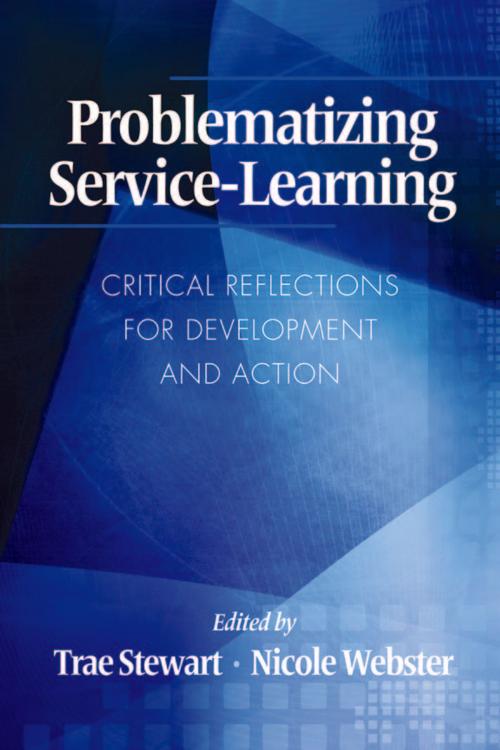Problematizing ServiceLearning
Critical Reflections for Development and Action
Nonfiction, Social & Cultural Studies, Social Science, Volunteer Work, Reference & Language, Education & Teaching| Author: | ISBN: | 9781617352119 | |
| Publisher: | Information Age Publishing | Publication: | December 1, 2010 |
| Imprint: | Information Age Publishing | Language: | English |
| Author: | |
| ISBN: | 9781617352119 |
| Publisher: | Information Age Publishing |
| Publication: | December 1, 2010 |
| Imprint: | Information Age Publishing |
| Language: | English |
Interest in and research on civic engagement and servicelearning have increased exponentially. In this rapid growth, efforts have been made to institutionalize pedagogies of engagement across both K12 and higher education. As a result, increased positive attention has been complemented equally by wellfounded critiques complicating experiential approaches’ claims and questioning if institutional, financial, and philosophical commitment is warranted. A key complaint from these critical voices is the tightly woven, protective insular core in the field of servicelearning. This claim is not unfounded, nor necessarily bad. Initial efforts to legitimize servicelearning and other forms of communitybased education required group cohesion. The concern, however, is that the initial group cohesion has led to groupthink wherein group members have avoided critical analysis and evaluation. This book aims to prevent groupthink within the field of servicelearning by allowing for the examination of effective alternatives by new voices who can serve as “critical evaluators” from within the field itself. Myriad perspectives are offered, including empirical, theoretical, practical, and community perspectives. Authors challenge preconceived notions of servicelearning, who is benefited by this pedagogy, outcomes of participation and implementation, and most importantly the theoretical, conceptual, and methodological lenses through which servicelearning is even considered. The book allows servicelearning’s major criticisms to be examined, challenges to be voiced, and research agendas to be laid. This book parallels servicelearning’s presence and popularity across various disciplines/fields. Chapters are written from broad perspectives and are aimed to inform servicelearning researchers and educators, community organizations, and policy makers who consider servicelearning as a means to address civic responsibility. Authors expose theoretical and philosophical concerns circulating in the field, and often still occupying spaces on the fringe of discourse, action, and research. The book raises fundamental questions for undergraduate and graduate courses with social justice themes by considering the implications that pedagogies of engagement have on learners and communities.
Interest in and research on civic engagement and servicelearning have increased exponentially. In this rapid growth, efforts have been made to institutionalize pedagogies of engagement across both K12 and higher education. As a result, increased positive attention has been complemented equally by wellfounded critiques complicating experiential approaches’ claims and questioning if institutional, financial, and philosophical commitment is warranted. A key complaint from these critical voices is the tightly woven, protective insular core in the field of servicelearning. This claim is not unfounded, nor necessarily bad. Initial efforts to legitimize servicelearning and other forms of communitybased education required group cohesion. The concern, however, is that the initial group cohesion has led to groupthink wherein group members have avoided critical analysis and evaluation. This book aims to prevent groupthink within the field of servicelearning by allowing for the examination of effective alternatives by new voices who can serve as “critical evaluators” from within the field itself. Myriad perspectives are offered, including empirical, theoretical, practical, and community perspectives. Authors challenge preconceived notions of servicelearning, who is benefited by this pedagogy, outcomes of participation and implementation, and most importantly the theoretical, conceptual, and methodological lenses through which servicelearning is even considered. The book allows servicelearning’s major criticisms to be examined, challenges to be voiced, and research agendas to be laid. This book parallels servicelearning’s presence and popularity across various disciplines/fields. Chapters are written from broad perspectives and are aimed to inform servicelearning researchers and educators, community organizations, and policy makers who consider servicelearning as a means to address civic responsibility. Authors expose theoretical and philosophical concerns circulating in the field, and often still occupying spaces on the fringe of discourse, action, and research. The book raises fundamental questions for undergraduate and graduate courses with social justice themes by considering the implications that pedagogies of engagement have on learners and communities.















